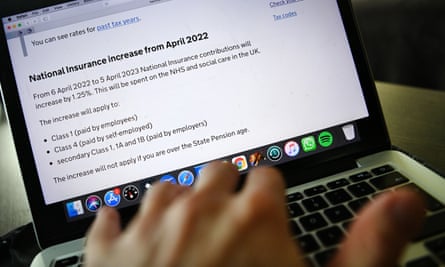
The cost of living crisis is poised to deepen in April, when national insurance contributions will rise by 1.25 percentage points, just as inflation, energy and water bills soar. There may not be a way to reduce your outgoings but it is possible to boost what you have coming into your account or to make your earnings go further.
Do as much ‘salary sacrifice’ as you can
From 6 April 2022, the planned rise in national insurance contributions means a worker earning £30,000 a year will see their take-home pay fall by £17 a month, or £214 a year, while someone earning £50,000 will lose £38 a month, or £456 a year.
However, you may be able to avoid some of this increase in your bill by paying for some things before you are taxed. Your employer may allow you to buy a bike or purchase an ultra-low emission car via a salary sacrifice scheme. These payments are taken off your gross income. The lower your gross income, the less you must pay in income tax and national insurance contributions.
“A lot of employees aren’t aware of the savings they can make by opting in to salary sacrifice,” says Dan Tomassen, a spokesperson for the accountancy firm HW Fisher.
This is particularly true of employees who have been auto-enrolled into a pension scheme, he says. “A lot of the time, the pension deductions that the employee has to contribute are taken from their net salary – so after tax has been deducted.” However, salary sacrifice schemes allow employers to reduce your gross salary in return for paying directly into your pension, thus reducing the amount of national insurance you have to pay on your lowered salary.
Note that your employer may allow you to donate to charity via a payroll giving scheme, such as the Charities Aid Foundation’s Give as You Earn programme. The donations will not reduce your national insurance contributions because they are taken from your pay after these are removed. However, they are taken before income tax is calculated and deducted, which could lower your tax bracket and reduce the amount of tax you pay.
 View image in fullscreenNational insurance contributions will increase from 6 April 2022. Photograph: Andy Rain/EPA
View image in fullscreenNational insurance contributions will increase from 6 April 2022. Photograph: Andy Rain/EPA
Employees used to be able to pay for childcare through salary sacrifice but that scheme has been replaced and is only available to those who signed up before October 2018.
Another option, if your employer offers a share incentive plan, is to buy “partnership shares” in the company you work for out of your pre-tax salary. This will cut the amount of national insurance you have to pay this year and – if you keep the shares for at least five years – you will never pay any income tax on their value. However, you may be liable for capital gains tax if the shares increase in value.
Claim your unused tax allowances
Another way to offset the national insurance increase is to take advantage of tax allowances you are entitled to claim.
For example, if you have been told to work from home – no matter how often – you are entitled to help from HMRC with expenses such as energy, internet costs and business calls. Your employer can pay you a fixed amount of up to £6 a week, tax free, to cover these costs or you can claim tax relief on £6 a week from the government instead.
“Your claim can be backdated for the last tax year as well, and even if you only worked at home for one day in the tax year, you can claim for the entire year,” says Paul Gibbons, a payroll specialist at PayDashboard. Bear in mind you will get relief at the rate at which you pay tax – so a basic-rate taxpayer will get £1.20 a week in tax relief (20% of £6), while a higher-rate taxpayer will get £2.40 a week. This means basic-rate taxpayers who work from home can claw back £62.40 a year in tax, while higher rate taxpayers are entitled to £124.80.
Another tax relief you may be able to claim is the marriage allowance, which applies not only to marriages but also to civil partnerships. About 2.4 million eligible couples are estimated to be missing out on this tax relief, worth up to £252 a year. “A lot of people don’t actually know this allowance exists,” Gibbons says.
 View image in fullscreenThe marriage allowance applies to marriages and civil partnerships but about 2.4 million eligible couples are estimated to be missing out on the tax relief. Photograph: Adrian Sherratt/Alamy
View image in fullscreenThe marriage allowance applies to marriages and civil partnerships but about 2.4 million eligible couples are estimated to be missing out on the tax relief. Photograph: Adrian Sherratt/Alamy
To claim, one member of the couple must earn less than £12,570 and their spouse or civil partner must be a basic-rate taxpayer. “Cohabitation is not sufficient,” says Emma Rawson, a technical officer at the Association of Taxation Technicians. You can backdate your claim to any tax year since 5 April 2017 that you were eligible, and if your spouse or civil partner has died since then, you can still claim by calling HMRC.
If you are required to wear a specific uniform at work, you may be able to claim tax relief on the cost of buying, cleaning, repairing or replacing it. This is “one of the most underused deductions that is available to a lot of people”, Tomassen says.
To qualify for the relief, you must be required to wear “clothing of a specialised nature that is recognisable as a uniform”, which demonstrates to a member of the public that you have a particular occupation. If your employer simply asks you to turn up to work wearing a shirt in a certain colour, you won’t qualify.
You can claim the relief on the cost of repairing or replacing “small tools” such as drill bits or scissors you need to do your job, along with specialist boots or particular shoes you need to wear as part of your uniform. It is worth noting that a deduction is not permitted for personal protective equipment.
The standard sum you can claim tax relief on is £60 a year, so basic-rate taxpayers who claim this relief will be £12 better off, while higher-rate taxpayers will get £24. Some industries qualify for larger allowances. An NHS ambulance worker who launders their uniform at home, for example, can claim tax relief on £185 of uniform expenses each year, meaning they will take home an extra £74 a year if they are a higher-rate taxpayer.
Check you are claiming benefits you are entitled to
It takes only 10 minutes, on average, to check whether there are state benefits you may be entitled to claim via the free benefits calculator on entitledto.co.uk. “We think that around £15bn of benefits are unclaimed across the population,” said Dr Phil Agulnik, an entitledto director. The main problem, he says, is that people assume their income is too high to qualify for any benefits, “so they don’t bother checking”.
People who are in work but on a low income are often entitled to claim more benefits than they realiseEntitledto’s Dr Phil Agulnik
In fact, means-tested benefits are awarded by assessing your income and your needs. “The more needs you’ve got, the more likely you are to qualify because you need more help,” Agulnik says.
Pensioners with large council tax bills and people who are in work but on a low income are often entitled to claim more benefits than they realise, he says. You may be eligible for universal credit, for example, even if you have a job. This benefit acts like a passport, enabling you to then claim other benefits. Recipients of universal credit may be entitled to help with health costs, housing grants, free school meals, energy efficient grants and the warm home discount.
 View image in fullscreenAn estimated 900,000 families are missing out on housing benefit.
View image in fullscreenAn estimated 900,000 families are missing out on housing benefit.
Photograph: Peter Scholey/Alamy
So even if you discover you are only eligible to receive a few pennies of universal credit each week, it is worth claiming this benefit to gain access to other help you may be entitled to. “Check it for yourself,” Agulnik urges. “Go through the calculator – £15bn is a lot of money.”
Unclaimed benefits: who is missing out?
Entitledto’s estimates of unclaimed benefits are based on what it describes as “sketchy statistics” because published government data is not good – and it is about to get worse. The Department for Work and Pensions recently put out a notice saying that it would no longer be publishing takeup rates for a number of benefits paid to working-age adults.
Of the benefits included in the figures, the two largest relate to housing – an estimated 900,000 families have been missing out on housing benefit worth a total of £2.8bn. Council tax support – a reduction of up to 100% of your bill – was going unclaimed by 2.8 million families (although the figures were last updated more than a decade ago). That help was worth a combined £2.6bn. Hundreds of thousands of households were also missing out on child tax credit or working tax credit, with about £2.5bn of each going unclaimed.
Hilary Osborne
This article was amended on 12 February 2022. The relevant earnings for marriage allowance eligibility are less than £12,570, not £12,500. It was further amended on 16 and 17 February 2022 to clarify how salary sacrifice schemes work in relation to pension contributions to help reduce national insurance contributions and tax; and to make clear that charitable giving via such schemes will not affect NICs. Also, it is not possible to claim housing benefit or tax credits while on universal credit.

